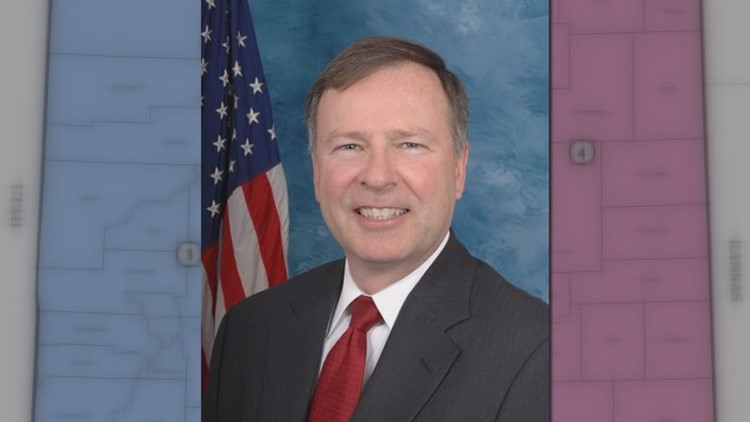DENVER — A lawsuit could potentially keep a six-term Congressman from qualifying for the primary ballot.
Rep. Doug Lamborn, R-Colorado, who has represented Congressional District Five, in and around Colorado Springs, since 2007, is being taken to court over signatures he turned in to qualify for the June primary election.
Lamborn needed 1,000 signatures of Republicans living in Congressional District Five to get his name on the ballot. The Secretary of State's Office certified 1,269 signatures.
The other way to get on the ballot is to garner 30 percent support through the Fifth Congressional District Assembly, which took place last weekend.
Five voters, four from Colorado Springs and one in Monument, have sued Secretary of State Wayne Williams over the certification of many of the signatures. In a Denver District Court filing, those voters claim that seven of the signature collectors do not meet the state requirements for residency, thus the signatures they turned in should not be counted toward Lamborn's total.
The lawsuit claims that six of the petition circulators are registered to vote using the same address in Thornton, and that another isn't truly a Colorado resident either.
The lawsuit said that four of those people registered to vote on Jan. 23, two on Feb. 16 and one never registered at all.
The Secretary of State's Office requires a circulator to sign an affidavit with their permanent address listed. The affidavit states that the person signing it is a resident of Colorado, registered to vote with the political party of the person they are collecting signatures for -- in this case, Republican -- and that they personally witnessed each signature
To certify the circulator as valid, the Secretary of State's Office confirms that the address on the form is the same address they are registered to vote, and that they are the same party as the candidate.
If either of those are incorrect, all the signatures collected from that person are disqualified.
"Did the Secretary of State's Office do anything wrong?" asked 9NEWS reporter Marshall Zelinger.
"I don't believe that we did, no. I think that we followed the statute exactly the way that it's spelled out," said Ben Schler, legal and policy manager for the Secretary of State's Office.
State election law is more specific on what "residency" means.
One section of the law states:
"In determining what is the principal or primary place of abode of a person, the following circumstances relating to the person shall be taken into account: Business pursuits, employment, income sources, residence for income or other tax purposes, age, marital status, residence of parents, spouse or civil union partner, and children, if any, leaseholds, situs of personal and real property, existence of any other residences and the amount of time spent at each residence, and motor vehicle registration."
A judge can have more leeway to investigate a signature collector's history than the Secretary of State's Office.
"Investigation is not what the Secretary of State's Office does," said Schler.
The lawsuit suggests that the seven circulators moved to Colorado for the purpose of collecting signatures and are not valid Colorado residents.
"If it's true that these people live in the same house and moved here just before they became the circulators, does that disqualify them?" asked Zelinger.
"I would be hesitant to say a hard yes or no with a question like that because for voter registration, when you start looking at whether or not a person is a resident, it's a very fact-based analysis, and that's a good reason it's going to court for the court to look at it," said Schler. I'd be hesitant to say, 'yes it matters' or 'no it doesn't matter' because what the statute says to us is 'was this person affiliated as shown on the voter registration rules at the time that he or she circulated the petition.'"
One of the five voters suing the Secretary of State over the signatures, Michael Kuhn, contributed $1,000 to one of Lamborn's opponents, State Sen. Owen Hill. Federal campaign finance reports show that the contribution was on June 22, 2017.
The attorney representing the five voters, Michael Francisco, contributed $2,700 to Hill's campaign on June 30, 2017.
"I donated to Owen a long time ago and haven't had any contact with him about this case," said Francisco. "I've personally voted for Lamborn, Darryl Glenn and Owen Hill in multiple elections."
Glenn is also running against Lamborn and qualified for the ballot by collecting and turning in signatures.
Francisco said this lawsuit came after reviewing the content of the signature collector affidavits.
"I noticed right away that seven of the circulators had the same address in Thornton," said Francisco.
He said it is a violation for three or more unrelated people to live in the same residence.
9NEWS went to the home in Thornton on Wednesday afternoon, but no one answered the door around 4 p.m.
A phone call and email to Lamborn's campaign spokesperson were not returned as of Wednesday evening.
If a judge were to agree that the circulators do not meet the residency criteria, they could throw out as many as 696 of Lamborn's 1,269 signatures. That would leave him with 573 signatures, well below the required amount, with no other avenue to qualify for the ballot.
The first hearing is expected next week.



